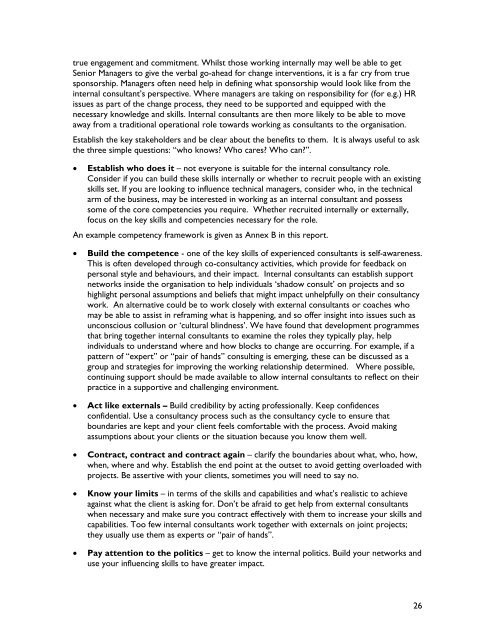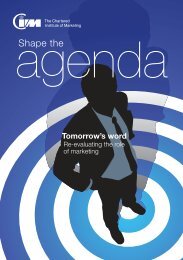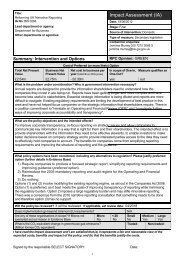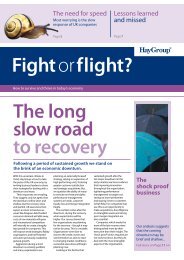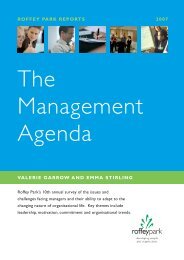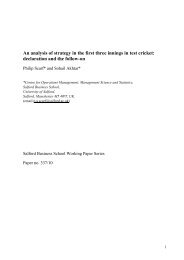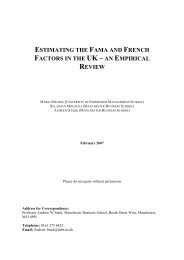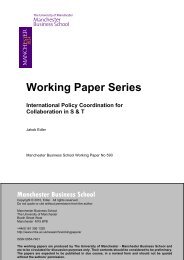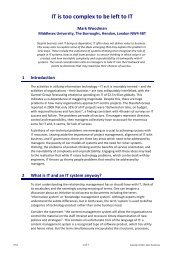The Role of the Internal Consultant - Management & Business ...
The Role of the Internal Consultant - Management & Business ...
The Role of the Internal Consultant - Management & Business ...
- No tags were found...
You also want an ePaper? Increase the reach of your titles
YUMPU automatically turns print PDFs into web optimized ePapers that Google loves.
true engagement and commitment. Whilst those working internally may well be able to getSenior Managers to give <strong>the</strong> verbal go-ahead for change interventions, it is a far cry from truesponsorship. Managers <strong>of</strong>ten need help in defining what sponsorship would look like from <strong>the</strong>internal consultant’s perspective. Where managers are taking on responsibility for (for e.g.) HRissues as part <strong>of</strong> <strong>the</strong> change process, <strong>the</strong>y need to be supported and equipped with <strong>the</strong>necessary knowledge and skills. <strong>Internal</strong> consultants are <strong>the</strong>n more likely to be able to moveaway from a traditional operational role towards working as consultants to <strong>the</strong> organisation.Establish <strong>the</strong> key stakeholders and be clear about <strong>the</strong> benefits to <strong>the</strong>m. It is always useful to ask<strong>the</strong> three simple questions: “who knows? Who cares? Who can?”.• Establish who does it – not everyone is suitable for <strong>the</strong> internal consultancy role.Consider if you can build <strong>the</strong>se skills internally or whe<strong>the</strong>r to recruit people with an existingskills set. If you are looking to influence technical managers, consider who, in <strong>the</strong> technicalarm <strong>of</strong> <strong>the</strong> business, may be interested in working as an internal consultant and possesssome <strong>of</strong> <strong>the</strong> core competencies you require. Whe<strong>the</strong>r recruited internally or externally,focus on <strong>the</strong> key skills and competencies necessary for <strong>the</strong> role.An example competency framework is given as Annex B in this report.• Build <strong>the</strong> competence - one <strong>of</strong> <strong>the</strong> key skills <strong>of</strong> experienced consultants is self-awareness.This is <strong>of</strong>ten developed through co-consultancy activities, which provide for feedback onpersonal style and behaviours, and <strong>the</strong>ir impact. <strong>Internal</strong> consultants can establish supportnetworks inside <strong>the</strong> organisation to help individuals ‘shadow consult’ on projects and sohighlight personal assumptions and beliefs that might impact unhelpfully on <strong>the</strong>ir consultancywork. An alternative could be to work closely with external consultants or coaches whomay be able to assist in reframing what is happening, and so <strong>of</strong>fer insight into issues such asunconscious collusion or ‘cultural blindness’. We have found that development programmesthat bring toge<strong>the</strong>r internal consultants to examine <strong>the</strong> roles <strong>the</strong>y typically play, helpindividuals to understand where and how blocks to change are occurring. For example, if apattern <strong>of</strong> “expert” or “pair <strong>of</strong> hands” consulting is emerging, <strong>the</strong>se can be discussed as agroup and strategies for improving <strong>the</strong> working relationship determined. Where possible,continuing support should be made available to allow internal consultants to reflect on <strong>the</strong>irpractice in a supportive and challenging environment.• Act like externals – Build credibility by acting pr<strong>of</strong>essionally. Keep confidencesconfidential. Use a consultancy process such as <strong>the</strong> consultancy cycle to ensure thatboundaries are kept and your client feels comfortable with <strong>the</strong> process. Avoid makingassumptions about your clients or <strong>the</strong> situation because you know <strong>the</strong>m well.• Contract, contract and contract again – clarify <strong>the</strong> boundaries about what, who, how,when, where and why. Establish <strong>the</strong> end point at <strong>the</strong> outset to avoid getting overloaded withprojects. Be assertive with your clients, sometimes you will need to say no.• Know your limits – in terms <strong>of</strong> <strong>the</strong> skills and capabilities and what’s realistic to achieveagainst what <strong>the</strong> client is asking for. Don’t be afraid to get help from external consultantswhen necessary and make sure you contract effectively with <strong>the</strong>m to increase your skills andcapabilities. Too few internal consultants work toge<strong>the</strong>r with externals on joint projects;<strong>the</strong>y usually use <strong>the</strong>m as experts or “pair <strong>of</strong> hands”.• Pay attention to <strong>the</strong> politics – get to know <strong>the</strong> internal politics. Build your networks anduse your influencing skills to have greater impact.26


